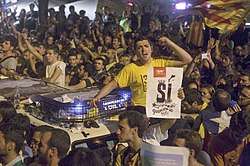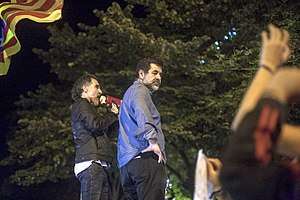Jordi Sànchez i Picanyol
| Jordi Sànchez i Picanyol | |
|---|---|
.jpg) Jordi Sànchez in 2017 | |
| President of the Catalan National Assembly | |
|
In office 2015–2017 | |
| Preceded by | Carme Forcadell |
| Succeeded by | Elisenda Paluzie |
| Member of the Parliament of Catalonia for the Province of Barcelona | |
|
In office 17 January 2018 – 10 July 2018 (suspended) | |
| Personal details | |
| Born |
1 October 1964 Barcelona, Catalonia, Spain |
| Nationality |
|
| Alma mater | Autonomous University of Barcelona |
| Occupation | Political activist |
| Known for | President of the Catalan National Assembly |
Jordi Sànchez i Picanyol (Barcelona, Spain, 1964) is a Spanish political activist, who has been president of the Catalan National Assembly (ANC) since May 2015.[1]
He was imprisoned in October 2017, accused of sedition in connection with the Catalan independence referendum.[2] In March 2018, following the Catalan regional election in December, he was proposed as candidate for president by the leading separatist Junts per Catalunya party, led by the former president Carles Puigdemont, who was in Belgium.[3] On July 10, 2018 a Supreme Court judge suspended him as a deputy in the Catalan parliament.[4]
Background
In 1991, he received a degree in Political Science from the Autonomous University of Barcelona. A part-time instructor at the University of Barcelona, he has also taught at other universities.[5][6]
He was the leader and spokesperson, with Àngel Colom, of the Crida a la Solidaritat (Call for Solidarity)[1] from 1983 until its dissolution in June 1993. Linked for many years to Iniciativa per Catalunya Verds, between 1996 and 2004 he was a board member of the Catalan Corporation for Public Broadcasting. In 1996 he was named assistant director of the Jaume Bofill Foundation, and then its director in 2001. He left the foundation in 2010 to take on a position as aide to the Ombudsman of Catalonia, Rafael Ribó, ex-leader of the ICV eco-socialists.[7]
In addition to contributing periodically as an analyst of social and political issues in various media, between 2004 and 2006 he coordinated the creation of one of the five areas of the Pacte Nacional per l'Educació (National Education Accord), specifically the one that laid out the foundations for a public education system. In 2008, he was the coordinator of one of the four areas of the Pacte Nacional per a la Immigració (National Immigration Accord), in particular the part that addressed the need to adapt social services.[8]
Catalan National Assembly
On 16 May 2015, Jordi Sànchez took over the presidency of the ANC from Carme Forcadell, after having been elected by a broad majority of the members of the group's National Board, meeting in Sant Vicenç Hall in the castle at Cardona despite the fact that the candidate who received the most votes from the organization's members was the US-born publisher and writer, Liz Castro.[1] Nevertheless, Sànchez was considered a consensus candidate, and had been supported by the outgoing Executive board.[1]
Imprisonment


On 16 October 2017, Jordi Sànchez and Jordi Cuixart were preventively jailed after the state attorney's accusation of sedition, a felony regulated by the article 544 and subsequents of the Spanish Criminal Code.[2][12][13]
This sedition was allegedly committed when they organized massive protests on 20 September 2017 during Operation Anubis police raids to dismantle the framework of the 1 October Catalan independence referendum performed by the Spanish Civil Guard.[14][15][16][17] They were accused of leading the protest of tens of thousands of people that surrounded the Catalan economy department heeding a call made by Òmnium Cultural and ANC.[2] The investigating judge stated that the leaders did not call for "peaceful demonstration but to the protection of Catalan officials through 'massive citizens' mobilisations"[18] and that Sànchez, on top of a vehicle, encouraged the demonstrators with expressions such as "no one goes home, it will be a long and intense night".[19] Footage from that night, however, shows Cuixart and Sànchez calling off the protests at 23.00.[20][11]
A sentence of sedition can carry up to 15 years in prison.[21][22]
Reactions
Catalan ex-President Carles Puigdemont and the European Free Alliance referred to Sànchez and Cuixart as "political prisoners".[23][24] The Spanish Justice Minister Rafael Catalá argued that they were not "political prisoners" but "imprisoned politicians".[25]
Amnesty International issued an official statement considering the charge of sedition and the preventive imprisonment "excessive" and called for their immediate release.
Amnesty International calls on Spanish authorities to drop the charges of sedition and to put an immediate end to their pre-trial detention.
— Amnesty International
Amnesty International does not consider them "prisoners of conscience". Amnesty International avoids the term "political prisoners" because there is no generally accepted definition of the term in international law and because generally speaking the term has many different meanings and interpretations. The term "political prisoners" is only used sporadically by the organisation as a descriptive term in specific cases with a strong political context. Amnesty explicitly avoids the term in cases where it might be confused with the term "prisoner of conscience". The organisation says the two terms should not be confused.[26][27][28]
On 19 October, 200,000 people with candles gathered in Avinguda Diagonal, Barcelona and on 21 October, 450,000 joined in Passeig de Gràcia to protest against their imprisonment.[29][30]
Another demonstration took place on 11 November, after the imprisonment of some members of the Catalan government, and congregated 750,000 people according to the local police.[31][32][33]
On 7 March 2018, the High Commissioner of the Office of the United Nations High Commissioner for Human Rights reminded Spanish authorities that "pre-trial detention should be considered a measure of last resort" referring to Catalan politicians and activists arrested after the independence referendum.[34] And on 23 March it reminded "Under rule 92 of the Committee's rules of procedure, the State party has also been requested to take all necessary measures to ensure that Mr. Jordi Sánchez I Picanyol can exercise his political rights in compliance with article 25 of the Covenant.".[35]
On 8 August 2018, PEN International made another statement asking Spanish authorities to release Cuixart and Sànchez and considered their detentions to be "an excessive and disproportionate restriction on their right to freedom of expression and peaceful assembly".[36][37]
References
- 1 2 3 4 Maiol, Roger. "Jordi Sànchez, nuevo presidente de la ANC" (in Spanish). Barcelona: El País. Retrieved 19 July 2015.
- 1 2 3 "The "Jordis" are not political prisoners – here's why". El País. Retrieved 2017-10-19.
- ↑ "From Exile, Puigdemont Abandons Pursuit Of Catalonian Presidency". NPR.org. Retrieved 2018-03-02.
- ↑ Llarena cierra el sumario del ‘procés’ y suspende como diputados a Puigdemont y Junqueras Published by El País, July 10, 2018, retrieved July 10, 2018
- ↑ "Jordi Sànchez i Maria Jesús Larios, nous adjunts al Síndic". Síndic de Greuges (in Catalan). Catalonia's Ombudsman. Retrieved 19 July 2015.
- ↑ "ANC Press Release (22 June)". Assemblea Nacional Catalana. 22 June 2015. Retrieved July 19, 2015.
- ↑ "Qui és Jordi Sànchez, nou president de l'ANC". 324.cat. 325.cat. 16 May 2015. Retrieved 19 July 2015.
- ↑ "Jordi Sánchez releva a Carme Forcadell al frente de la ANC". Agencia EFE. 16 May 2015. Retrieved 19 July 2015.
- 1 2 "La Fiscalía denuncia por sedición en la Audiencia Nacional los incidentes de Barcelona tras las detenciones" (in Spanish). eldiario.es. 22 September 2017. Retrieved 20 October 2017.
- ↑ "La Fiscalía pedirá investigar por sedición los disturbios en Cataluña" (in Spanish). eldiario.es. 22 September 2017. Retrieved 20 October 2017.
- 1 2 Roures, Jaume (11 July 2018). 20-S (Television production). Mediapro. Retrieved 3 July 2018.
- ↑ "¿Qué es el delito de sedición? Así lo regula el Código Penal" (in Spanish). El Periódico. 17 October 2017. Retrieved 27 October 2017.
- ↑ "Ley Orgánica 10/1995, de 23 de noviembre, del Código Penal" (in Spanish). Retrieved 27 October 2017.
Article 544. Seditionists are those who, without being included in the crime of rebellion, rise publicly and tumultually to prevent, by force or outside legal channels, the application of the Laws or any authority, official corporation or public official, the legitimate exercise of their functions or compliance with their agreements, or administrative or judicial decisions. Article 545. 1. Those who have induced, sustained or directed the sedition or appear in it as its principal authors, shall be punished with imprisonment from eight to ten years, and from ten to fifteen years, if they were persons constituted in authority. In both cases, absolute disqualification will also be imposed for the same time.
- ↑ Fotheringham, Alasdair (16 October 2017). "Catalonia: Spanish judge jails two independence leaders for possible sedition". The Independent.
An ongoing legal investigation claims Jordi Sanchez and Jordi Cuixart, the leader of the ANC movement, and Mr Cuixart, who heads the Omnium Cultural association, were heavily involved in organising a massive protest aimed at hindering a Guardia Civil investigation in Barcelona into the build-up for the 1 October illegal referendum.
- ↑ "La Guardia Civil cercena el 1-O" (in Spanish). El Mundo. 20 September 2017. Retrieved 18 October 2017.
- ↑ "Spain High Court jails Catalan separatist leaders pending investigation". 17 October 2017.
- ↑ "European Commission - Press release - Statement on the events in Catalonia". europa.eu. 2 October 2017.
- ↑ Stone, Jon (20 September 2017). "Spanish police storm Catalan government buildings to stop independence referendum". Independent. Europe correspondent. Retrieved 25 October 2017.
- ↑ "Los 'Jordis' a prisión por "alentar a la masa" contra la Guardia Civil el 20-S" (in Spanish). El Español. 16 October 2017. Retrieved 25 October 2017.
- ↑ "Un vídeo muestra cómo Cuixart y Sànchez intentaron disolver la manifestación de Economia". La Vanguardia. Retrieved 2017-10-18.
- ↑ Strange, Hannah (16 October 2017). "Two Catalan independence leaders taken into custody by Spanish national court". The Telegraph. Barcelona. Retrieved 16 October 2017.
- ↑ Powell, Tom (16 October 2017). "Spanish judge jails two Catalan separatist leaders during sedition investigation". Evening Standard. Retrieved 16 October 2017.
- ↑ ""We have political prisoners again," says Catalan president". CatalanNews. Retrieved 2017-10-17.
- ↑ "EU's latest political prisoners". European Free Alliance. Retrieved 2017-10-21.
- ↑ "Political Prisoner or Jailed Politician? It's Catalans' Spin Battle With Spain". 18 October 2017. Retrieved 28 October 2017.
- ↑ "Spain: charges for sedition and pre-trial detention against Jordi Cuixart and Jordi Sanchez are excessive". Amnesty International. Retrieved 2017-10-18.
- ↑ "Amnistía no ve como presos políticos a los dirigentes catalanes detenidos". El Mundo. 8 November 2017. Retrieved 8 November 2017.
- ↑ "Spanje: recente ontwikkelingen in Catalonië". Amnesty International. Retrieved 28 March 2018.
- ↑ "200.000 persones, segons la Guàrdia Urbana, omplen d'espelmes la Diagonal contra l'empresonament de Sànchez i Cuixart". VilaWeb (in Catalan). 2017-10-24. Retrieved 2018-01-14.
- ↑ "Barcelona crida per la llibertat dels presos i de les institucions". Ara.cat (in Catalan). Retrieved 2018-01-14.
- ↑ "Unos 750.000 manifestantes en Barcelona según la Guardia Urbana". eldia.es (in Spanish). 2017-11-11. Retrieved 2018-01-14.
- ↑ "Mass protest in Barcelona demands freedom for Catalan leaders". geo.tv. 2017-11-11. Retrieved 2018-01-14.
- ↑ "Spain Catalonia: Barcelona rally urges prisoners' release". BBC. 2017-11-11. Retrieved 2018-01-14.
- ↑ "High Commissioner's global update of human rights concerns". OHCHR. 2018-03-07. Retrieved 2018-03-08.
- ↑ "L'ONU insta l'estat espanyol a garantir els drets polítics de Jordi Sànchez". CCMA (in Catalan). 2018-03-25. Retrieved 2018-03-25.
- ↑ "Statement following PEN International's visit to imprisoned Catalan civil society leaders". PEN International. 8 August 2018. Retrieved 9 August 2018.
- ↑ "El PEN Internacional diu que l'empresonament de Cuixart i Sánchez és "excessiu"". El Món (in Catalan). 9 August 2018. Retrieved 9 August 2018.